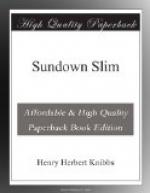Sometime in the night, Bud Shoop was awakened by the man next him.
“What’s goin’ on?” queried Shoop, rising on his elbow.
“Ask me again,” said the puncher. “Listen!”
From the vicinity of the wagon came the gurgle of water and then a distinctly canine sneeze.
“Dinged if he ain’t fussin’ with that dog again!” grumbled Shoop. “The dam’ fool!” Which, as it is the spirit which giveth life to the letter, was not altogether uncomplimentary.
CHAPTER XII
A GIFT
Warned by John Corliss of Loring’s evident intent to graze his sheep on the west side of the Concho River, the cattle-men held a quiet meeting at the ranch of the Concho and voted unanimously to round up a month earlier than usual. The market was at a fair level. Beef was in demand. Moreover, the round-up would, by the mere physical presence of the riders and the cattle, check for the time being any such move as Loring contemplated, as the camps would be at the ford. Meanwhile the cattle-men again petitioned the Ranger at Antelope to stir up the service at Washington in regard to grazing allotments.
The round-up began. The Concho outfit moved camp to the ford and Sundown had his first introduction to real work. From morning till night and far into the night the fires were going. Groups of belated riders swung in and made for the chuck-wagons. Sundown, following a strenuous eighteen hours of uninterrupted toil, solemnly borrowed a piece of “tarp” from his outfit on which he lettered the legend:—
“CAFE DE CONCHO—MEELS
AT ALL
HOURS—PRIVIT TABELS FOR LADYS”
He hung the tarp in a conspicuous place and retired to rest. The following morning his efforts were applauded with much picturesque expletive, and even criticism was evoked by a lean puncher who insisted “that the tall guy might be a good cook all right, but he sure didn’t know how to spell ‘calf.’” Naturally the puncher’s erudition leaned toward cattle and the range.
At all times conspicuous, for he topped by a head and shoulders the tallest rider on the range. Sundown became doubly conspicuous as the story of his experience with the hold-ups and his rescue of Chance became known. If he strutted, it was pardonable, for he strutted among men difficult to wrest approval from, and he had won their approval.
At Hi Wingle’s suggestion, he “packed a gun”—a formidable .45 lent him by that gracious individual, for it grieved the solid Wingle’s soul to see so notable a character go unarmed. Sundown, like many a wiser man, was not indifferent to the effect of clothing and equipment. Obliged frequently to relate his midnight adventure with the robbers, he became a past-master in the art of dramatic expression. “If I’d ‘a’ had me gun with me,” he was wont to say, slapping the holster significantly, “the deal might ‘a’ turned out different. I reckon it’s luck I didn’t.” Which may have been true enough, for Sundown would undoubtedly have been afraid to use the weapon and Fadeaway might have misunderstood his bungling.




